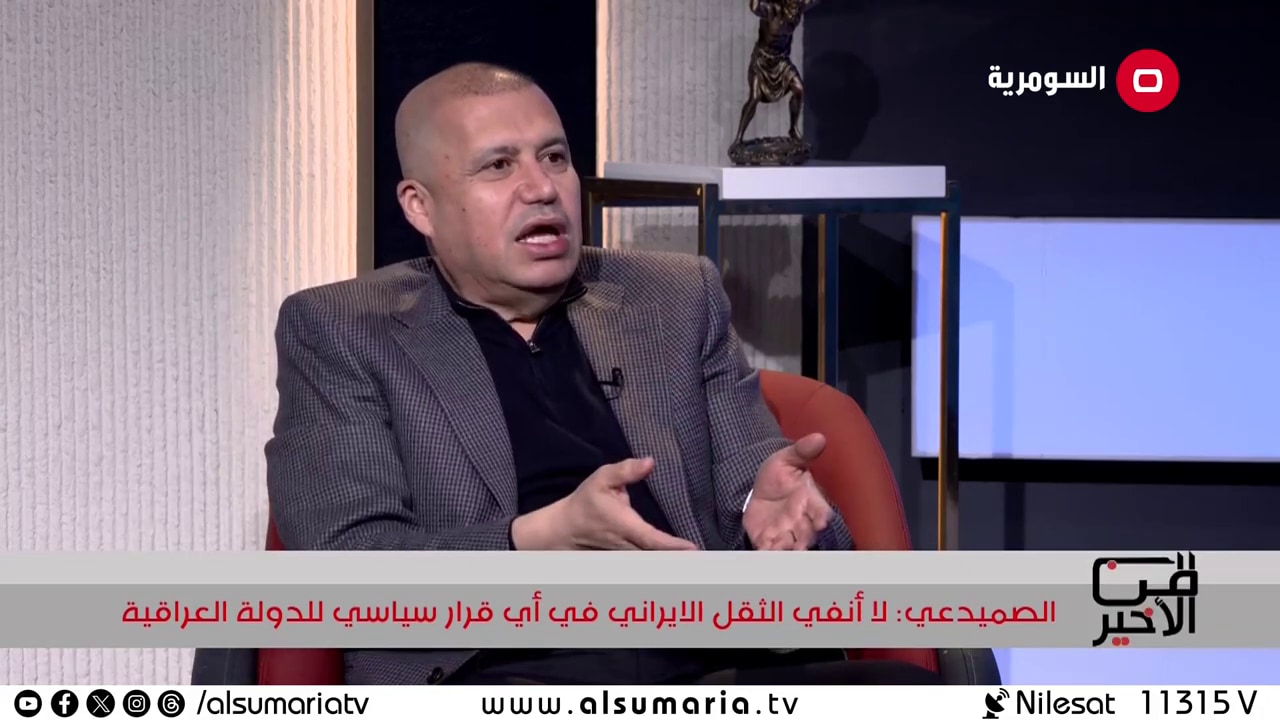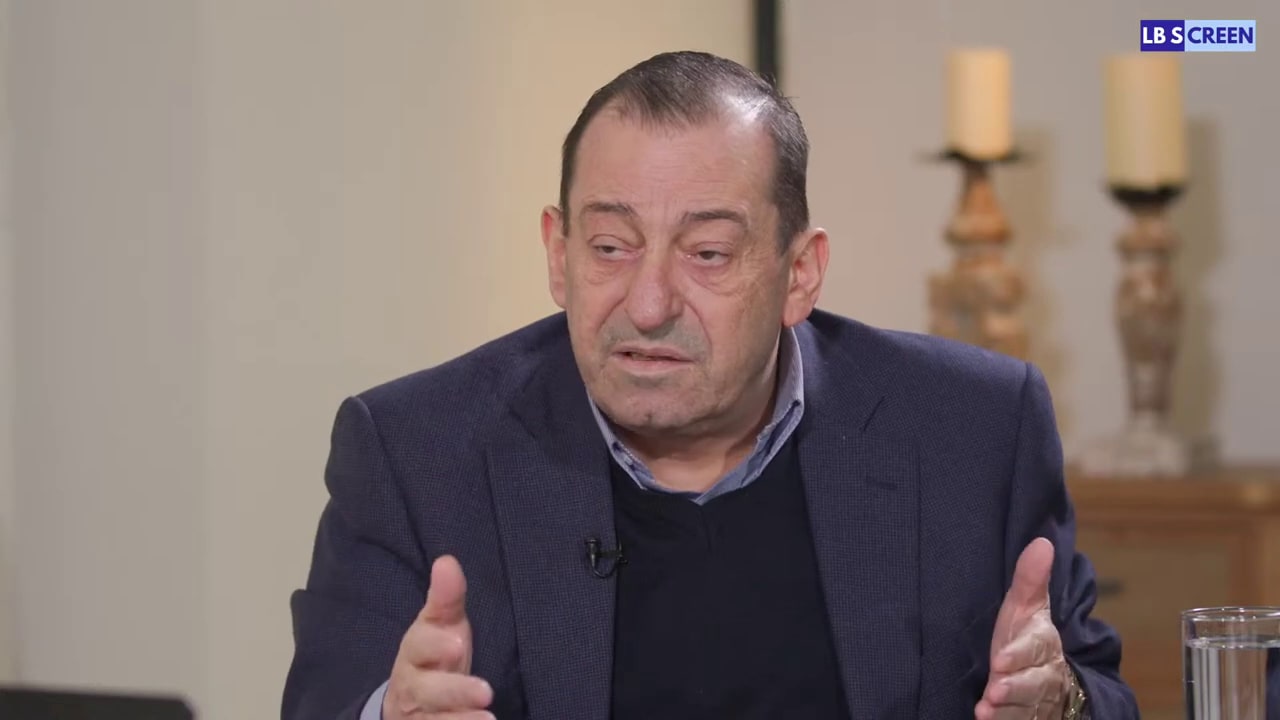
Syrian-American human rights activist Ammar Abdulhamid and Egyptian-American researcher Samuel Tadros discussed Zionism and Israel on an August 15, 2019 show on Al-Hurra TV (United States). Ammar Abdulhamid said that there is a colonialist-imperialist streak in all civilizations and this means that the colonialist aspects of Zionism are not unique. He argued that the Arabs have become nihilistic with regard to Israel because they focused on annihilating Israel instead of building a Palestinian state right from the start. He also said that one cannot ignore the role that Arab Jews played in Israel's establishment and the fact that they did so in order to escape persecution by Muslim Arabs. In addition, Abdulhamid pointed out that the West was not always supportive of Israel, despite Arab claims that the West planted Israel as a foreign cancer in the Middle East. He added that Israel is the most successful and most stable country in the Middle East and it would make no sense for Israel to be annihilated while unstable countries like Egypt and Syria survived.
Samuel Tadros said that Israel is the only country to have successfully resurrected a dead language. He said that the Holocaust proved Theodor Herzl's argument that Zionism is the solution to the fact that other nations will never accept the Jews. Tadros added that the idea that Israel is a foreign cancer planted by the West ignores the historical presence of Jews throughout history in Palestine and the Middle East. Tadros also said that the fact that the Jews successfully established the thriving State of Israel, despite coming from different places and speaking different language, should serve as a “very important lesson to anyone trying to establish a state.”
Following are excerpts:
Ammar Abdulhamid: "Since ancient times, the human order has been that when a certain tribe or people suffered famine, destitution, or any other problem in a certain region, they would move to another area. If they had to, they would raid your people. If they were allowed to settle in the land, then they did so peacefully. These solutions have always existed. The colonialist-imperialist streak is innate in the genes of nations and countries, so we cannot say that [Zionism] is exceptional in this sense. What is special about this movement is that they collectively moved to another area without taking into consideration the rights of the original people on that land. Here we have a problem, and we will discuss it...
Samuel Tadros: "And others do believe in the rights of the original people? But I do think that there are some unique aspects [about Zionism]. For example, they resurrected a dead language. Nobody else has done this. The Copts dream of restoring the Coptic language, and the Assyrians dream of preserving their language, but the reality is that languages die. Hebrew is the only successful case of a dead language being resurrected. We do have a certain uniqueness in the Jewish story, compared to other examples.
[...]
"The Holocaust was a watershed moment in the history of Zionism because it proved that Herzl had been right. It proved that Herzl was correct in saying: 'They will never accept you.' Six million people paid the price for that mistake. As a result, many Jews considered Zionism again, and they concluded that, after this, there is no solution other than the one Herzl had arrived at."
[...]
Ammar Abdulhamid: "The rights of the [Palestinian] people were violated. There is no escaping that. When the international community agreed to the partition, it set forth a certain vision for how to arrive at a resolution through the establishment of a Palestinian state. All the efforts should have focused on that right from the start. One may say that there were such efforts on the political level, but when it came to the public opinion, to the official discourse, and to what we were taught at school, it was not so. The war was to erase the Israeli entity, and this is what brought us to a nihilistic position."
[...]
Samuel Tadros: "So you have a problem in the lands that were in Mandatory Palestine, but in the collective Arab mind, we imagine something completely different. We claim that the goal of the Israelis is to expand their state from the Nile to the Euphrates. I don't know where they got this nonsense. They tell you that the two lines on the Israeli flag represent the Nile and the Euphrates, and that such a map hangs in the Knesset."
[...]
Ammar Abdulhamid: "This is a very big problem and it has been used by important figures in our intellectual elite. They have not tried to bring us down from illusion to reality and to make us deal with the real particulars of the conflict instead of creating an illusion about it."
[...]
Samuel Tadros: "One of the most dangerous ideas is that Zionism brought people who had nothing to do with the region and that it planted them like a foreign cancer. This idea ignores the Jewish presence throughout history – not just in different countries in the region like Egypt, Syria, Iraq, and Morocco, but also in the territory of the Ottoman state, like Jerusalem, Jericho, and all those cities. They have been there throughout history."
Ammar Abdulhamid: "The Jews constituted an inseparable part of the Palestinian fabric and fabric of the region as a whole. The Arab Jews participated in the establishment of the State of Israel, and with time they have become the majority on the ground. We cannot ignore this reality. The reason that so many Arab Jews were drawn to the Zionist project was their persecution, and the concept of second-rate citizens..."
Samuel Tadros: "The concept of dhimmi..."
Ammar Abdulhamid: "Yes, the dhimmi concept still captures people's imagination. So the [Jews] reached the point where they wanted to get rid of all of this."
Samuel Tadros: "The idea of a cancer coming from abroad is not only connected to Zionism. They claim that it was the West that planted Zionism in our region. It is as if the Jews have done nothing to establish their own state. The success of the Zionist movement should have served as a very important lesson to anyone trying to establish a state. Those people spoke different languages, they had come from different places, and they had arrived at a foreign land, where they were not accustomed to the weather or anything, yet they established a state with agriculture, industry, and an army. Do you really want to ignore all this and say that the West planted them?"
Ammar Abdulhamid: "In addition, there is ignorance regarding the West's position regarding [Israel]. The West was not supportive of them. At one point, the British were very hostile towards the Zionist movement, because it caused them a headache and problems with the Arab countries. Even Truman's administration did not recognize Israel's right [to exist] at first."
[...]
Samuel Tadros: "Many people still dream that Saladin will come, and that he will resolve the problem, and that we will annihilate Israel... Israel has become a reality."
Ammar Abdulhamid: "It is not just that we must accept Israel as the reality – Israel is the most successful country in the Middle East. Why would it be annihilated while other countries survived – countries like Egypt or Syria, which still don't know how to achieve stability? The survival of countries depends on their ability to run themselves and to fulfill the aspiration of their people. Of all countries in the region, Israel is the most likely to achieve this."














